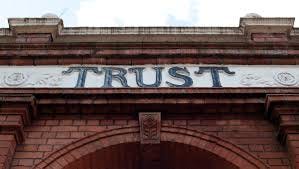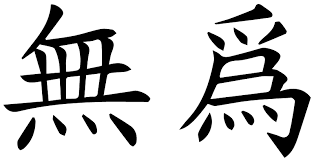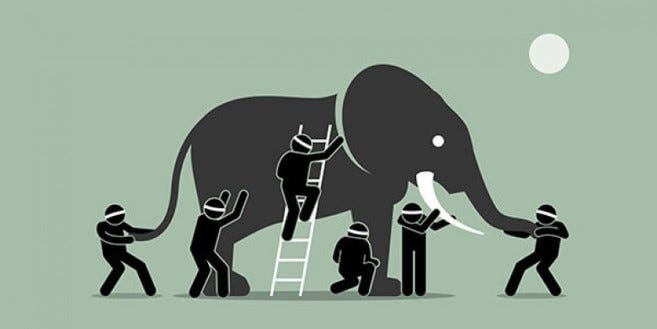Author’s Note: I am speaking primarily to a generally privileged North American audience. While I believe the underlying idea to be globally relevant, it feels more urgent for me to speak to those coming from a similar trajectory to my own. I suspect this is old news to people reading from the global south, indigenous communities, POC and others who have been more directly and brutally impacted by colonialism. My apologies in advance if I have taken liberties with ideas or misrepresented them and I look forward to learning from any insights you are willing to share.
The Very Short Form
The driver behind all current crises — climate and environmental catastrophe, biodiversity loss, rising economic and political inequality, rising authoritarianism, (the list goes on) is wetiko / wendigo.
That’s good news because it provides a simple solution: heal from wetiko.
The bad news is that all of our social institutions are based on wetiko values. And any society based on the fevered delusions of wetiko is doomed to collapse sooner rather than later. It’s likely that ours is currently in some stage of collapse. The question is really how far along are we. Even if it isn’t in collapse, it’s days are numbered simply by its absolute dependence on limited resources that will soon run out.
One way or the other, we need wetiko-free social institutions if we are to survive and thrive, and we will have to build them from the ground up.
Unfortunately, we can’t do that until we heal ourselves from wetiko, which feels a bit like a catch-22.
But there’s hope. Wetiko is fundamentally the delusion of separation; a loss of connection. The antidote is to rebuild connections to all our relations; with our fellow humans, with the land and all living things, and with Life itself. In doing so, we will build wetiko-free institutions as we go.
This cannot be done on your own. Self-help, by definition, contributes to the wetiko virus. We can only heal in what basically looks like a wu-wei or flow sangha.
To create a wu-wei or flow sangha, 1) start where you are (literally and figuratively), 2) follow a process like the one laid out in Sociocracy 3.0, and 3) build energy through an iterative aim-act-reflect process focused on short, sharp and shiny cooperative projects.
Starting to Unpack It
I had a Zoom call with friends in the US last week. Like many people, they are simply stunned by the childish disregard for public safety that many of their neighbours are demonstrating. We all grapple with the insanity of it. People dying of covid, spouting conspiracy theories with their dying breath. A significant percentage of people closing their eyes to verifiable facts, yet willing to believe the hate-filled lies of demagogues. As we talked, I could see the penny drop for one of my friends and she said “it’s sobering to realize that they honestly don’t care if I live of die. They are willing to kill me just so they don’t have to be inconvenienced by a freakin’ mask.”
Waking up to Wetiko
This is what it’s like to wake up to Wetiko. Wetiko (also spelled wendigo with about a dozen other variants) is an Algonquin allegory about a ravenous, cannibalistic being. It roams the earth consuming everything. It’s insatiable because everything it consumes just makes it bigger and therefore hungrier. It’s the embodiment of greed and excess.
Wetiko is fundamentally a disease of disconnection. The wetiko is driven mad by the hollowness it created by severing its relationship to the community. It’s as though the cannibal thinks it can eat it’s own flesh and somehow come out ahead. It can’t see that it is, in fact, killing itself.
Waking up to wetiko is like waking up the morning after a hard night out. The first glimmers are pretty vague — just a general sense that you don’t feel well with a really bad taste in your mouth. For a while, you struggle, shielding your eyes from the pain of the bright light. At first, you can only catch a glimpse of it before you have to close your eyes again; blinking into the glare.
Finally, you can open your eyes enough to try to see what’s out there. It’s not a pretty sight. The wanton environmental destruction. The careless disregard for human life. The violence. The trauma. The insanity.
Where once we had neighbours, suddenly we’re surround by wetiko: these fear-zombies hellbent on some massive murder-suicide pact.
Then slowly the second penny drops; it dawns on you that you are just looking in the mirror.
Wetiko Society
Waking up to wetiko is, in effect, waking up from wetiko. That same callous disregard for the common good laid bare in trumpsters and anti-maskers has been around for a long time. Longer than you. You were born into a society that’s been built from the ground up around wetiko values. You were raised to believe the lies that support the system — “the oppressed deserve their lot,” “some people count more than others,” “what happens ‘over there’ is none of your concern.”
Apocalypse only means “revelation.”
Black Lives Matter is simply showing what’s been there in plain sight for generations and yet we allowed it to persist. The way the rich have profited during the pandemic, while the poor have been left to die is just the latest example in an unending string of examples. The climate crisis didn’t pop out of nowhere. It’s been a topic of heated debate and complete inaction for over 40 years, while greenhouse gas emissions reach record highs and the nightly news covers the latest climate catastrophe in real time.
All the while, we worried more about our comfort and convenience than the impact we were having on communities, individuals, and all living things. Don’t get me wrong. We cared. We all cared a lot. Enough to post things on Facebook or even sign a petition or two. Hell, some of us even bought those fancy lightbulbs. But doing much more than that was just too inconvenient, wasn’t it? After all, you gotta pay the mortgage, right?
A culture based on wetiko values — on predation and consumption, radical individualism, and insatiable growth — will inevitably collapse because it will consume itself out of existence. Wetiko produces a mindless consumptive fog that has kept us blind to the consequences of our own actions for decades if not generations.
A little over a year ago [2019], a Melbourne think-tank published a report predicting societal collapse due to climate breakdown by 2050. It became the hot topic of debate among the talking heads. They debated whether societal collapse was even a possibility or if this was just more fear-mongering and hyperbole. At the time, I wondered how the authors thought we could hold it together for another 30 years.
Flash forward one year [to 2020 and the pandemic]. Suddenly, social collapse seems a lot closer. The news is filled with social unrest met with authoritarian responses, wrapped in a pandemic living inside a climate catastrophe — and it’s all only getting started. Somewhere in the back of your mind, you must have been wondering the same thing: are we already there?
What is society? Cooperative structures, powered by trust.
But what is societal collapse? To understand collapse, you have to understand society. Society is basically built on a foundation of trust. Individual bricks of trust are made through long-term, cooperative relationships and slowly over time we start to stack that trust up, brick on brick, to eventually build these structures we call institutions which collectively become society.
Throughout human history, a lonely human is a dead human. Ironically, only people living in a complex interdependent society would fantasize about “rugged individualism.” In reality, we humans can’t survive on our own. We need cooperation to provide the basics of our survival. When the community works together, everyone benefits — everyone thrives. At the level of a band or hamlet this is perfectly obvious.
Eventually, it occurs to people that they would be even better off if they found even better ways to cooperate. They figure out how to cooperate between hamlets and bands to develop towns and tribes. In this way, we stack bricks of trust on top of each other to create bigger agreements for collective cooperation.

Institutions are nothing more than complex webs of trust developed over years of effective cooperation. All based on something we might call the Implicit Social Contract: a fundamental belief that, all things considered, we’re better off working together than going it on our own.
Delayed Gratification, Compromise and Trust
Ultimately, these institutions run on trust because cooperation requires compromise and delayed gratification. When we cooperate, we all end up giving a little in order to get more in return. But there is always a time-delay between planting the orchard and harvesting the fruits. Plus dividing the work into specialties is more efficient, but makes it harder to compare relative contributions.
The more complicated society gets, the more layers there are between people, their work, and the fruits of cooperation; the more opportunities there are for social parasites to start to feed off the stores of trust everyone else has worked so hard to develop. The parasites come in two basic varieties: con men and bullies. They are collectively referred to as the rich. In both cases, these parasites take advantage of trust so that they don’t have to work as hard as everyone else. These are the proto-witeko, who think they can eat their own leg and somehow come out ahead. They think they can cheat on the Implicit Social Contract and get away with it. And for a while, they can.
These trust parasites have existed even in the best of times in the healthiest of societies. However, healthy societies have effective ways to fend off the parasites and heal the breach in trust they cause before it goes critical. Institutions are built so they aren’t so dependent on any one or two bricks and customs and rituals develop to prevent cascade failures. Effort is taken to repair the wounds to trust that inevitably develop. In fact, in some ways, this is basically what “society” is — a coordinated effort to grow, protect and heal the trusting relationships that allow widespread cooperation to occur for collective mutual benefit.
Unfortunately, there seems to be a predictable tendency in human society. It’s a variant of the standard predator / prey dynamic. When prey species have a population explosion, it makes it easy for predators to get fat and happy. This causes an explosion in the predator species and pretty soon all those hungry mouths gobble up not only the previous “glut” of prey, but they start eating away at the breeding stock, causing the prey population to collapse. But of course, once the prey population collapses the predators collapse, too.
At some point, the success of a society at growing and maintaining trust produces a bumper crop of trust parasites. It causes an epidemic of wetiko. The parasites grow strong from their early easy pickings and recruit more to their army, and wetiko becomes a contagion. Eventually, the dead weight of the parasites starts to crush the bricks at the very bottom. The Implicit Social Contract collapses and people begin to doubt that there’s any advantage to them in maintaining any social contract.
A trust breach, like an atomic blast —
Trust is powerful, but volatile stuff. If the agreements aren’t maintained — if the Implicit Social Contract is violated — the trust simply disappears. That’s not quite the right word, though, because it makes it seem like the trust just fades away. Anyone who’s been through a bad breakup knows that’s not how it happens. Breaking a trust bond is more like splitting an atom: it takes a tremendous amount of force to break the bond, but when it breaks it releases magnitudes more.
The break down of trust creates a cascade effect. A breach of trust in one spot explodes in such a way that it stresses the trust of those around it. At some point without intervention, things reach a critical mass and even the most basic relationships between neighbours and family are strained to the breaking point. (Sound familiar?)
So, the preconditions of collapse are apparent well before the final cascade failure. We start to see the collapse of trusting relationships without any effort to repair the damage. We start to notice one broken bond exploding in ways that strain the trust bonds around them. We see all the missing bricks in the facades of our institutions and things start to look pretty wobbly.
Sadly, I think we may be past the event horizon for whatever is about to come. To paraphrase Gibson, “societal collapse is already here, it’s just unevenly distributed.” Ultimately, collapse looks like fear. When you fear your neighbours. When you can’t trust what you read. When it feels like some elected officials are actually out to get you and people like you. When the trusting relationship collapses, it explodes into fear.

The Rise of the Fear-Zombies
FDR said the only thing we have to fear is fear itself, but that’s not to be taken lightly. Fear is a tricky enemy. Fear makes it seem sane to do insane things. Fear warps and bends reality. We know from neurobiology that fear alters basic perceptions. Physically, your field of vision is reduced to tunnel vision. Metaphorically, too. When fear is induced in subjects, they mis-identify non-threatening objects as threats significantly more often than control subjects. Physical responses are overpowered and uncoordinated. Comprehension of basic ideas is diminished to the point that people will have trouble doing simple arithmetic. We know this from experimental evidence. It is both fact and metaphor.
So, when fear sets in and takes hold of a few people; they start to act out in bizarre and dangerous ways. Well, the natural response of the people exposed to those irrational, dangerous fear-zombies is to be afraid. They are bitten by the curse before the zombies even have a chance to bite. Now, there are even more fear-zombies roaming around, banding together and taking over entire neighbourhoods, cities, states, and nations.
Zombies invade the halls of power and eat the inhabitants whole! Suddenly, the fear zombies control the media, the government, and the corporations! Voracious, insatiable — the fear disease causes incontrollable appetites!! The Zombies consume!!! It’s all they do!!!! And they’re coming for you!!!!!
What sane person wouldn’t be afraid?!?
Here’s the catch, though. When you are overcome by fear, you are by definition no longer sane. You are not capable of reason, of discernment, of choice. In the throes of panic, you’re barely capable of breathing.
So, how do you fight a fear zombie?
Symptom Progression and Recovery
First, we need to recognize fear-zombies as simply a phase in the progression of the disease of wetiko. Therefore, it’s important to understand the lifecycle of the disease itself.
Wetiko is basically an autoimmune disorder of the social body. In it, parts of the body start to think of themselves as separate and see the body itself as an enemy; a thing to be destroyed, laid to waste. They begin to attack and consume the social body around it and naturally the parts near it, sensing the attack, become defensive and cut themselves off; isolate. In other words, they too become fear-zombies.
Hurt people hurt people, so the infection spreads. It becomes an epidemic of fear-zombies. And fearing the fear-zombies means you have already been infected.
Since wetiko is fundamentally a disease of disconnection — the delusion of separation — the cure is found in reconnection. It can’t be done on your own. Self-help, by definition, merely adds strength to the virus by reaffirming that it’s poor little you vs. the universe. Who wouldn’t be terrified if this were the case?!?
Instead, we must take the steps necessary to reconnect with all our relations — with all our human relations, our non-human relations, the land, and with Life itself. As we do, with each healed relationship, trust grows and fears subside.
Ah, but here’s the catch. We are only just waking from the fever; we aren’t cured yet. As we look to our relations, we must face the mess we’ve made in our delusional state. We need to see the damage our past actions have contributed to and make amends. We won’t be healed until our relations are healed. And that requires that first we show up, then grow up. First, we must learn to step out from behind our ingrained defenses — which are nothing more than wetiko conditioning. Then, we must take responsibility for the consequences of our actions and care about all our relations. In doing this, we weed out the last traces of our careless, cannibalistic tendencies.
The Blind Leading the Blind
So, we find ourselves in this curious place. If you can see wetiko, you can also see that it’s a sign you are in recovery. Waking to wetiko is the first step in the recovery process, not the last. We begin to recognize that our habits and beliefs are mostly defense mechanisms, all tainted by wetiko and a culture that is still dominated by it. And there is always the danger of relapse. In these early stages of recovery, the fevered delusions of wetiko are never that far away, just waiting to get triggered. In our fragile state, we need a supportive environment to allow the process of reconnection to occur yet we have to build it for ourselves; the blind leading the blind.
The fact that we can see wetiko means there’s hope. There is a Quaker tradition of seeking “way open.” Parker Palmer points out that “way closed” is useful information, too. The horror of seeing wetiko is confirmation of “way closed.” We see clearly how this delusion of separation leads to a hollowness that drives a crazy-making hunger. We recognize that attempting to dominate and control leads inevitably to devastation. This is the direction we turn from.
And that suggests “way open” — an alternative that’s been hidden in plain sight for generations. You cannot fight wetiko directly. That only feeds it and makes it more powerful. Instead, you cancel it by growing its complement.
Wetiko could easily serve as a Taoist cautionary tale on the limits of wei. Wei is roughly defined as “action” but it’s action with a certain character. Wei is purposeful, analytical, dominating, martial, yang. It’s motto is “divide and conquer.”
So, turning away from wetiko, is turning torwards wu-wei or “non-action.” Wu-wei isn’t inaction or passivity. Alan Watts describes it as the kind of energy that propels a seed to bloom or a tree to grow. It’s also the energy that keeps you alive, that keeps your heart pumping and your lungs exchanging oxygen. It is the energy of Life and living things.

It’s the difference between striving (wei) and flowing (wu-wei).
Because wu-wei is the characteristic energy of life, it means that all of us — as living creatures — have direct access to it. We experience wu-wei directly in flow moments — those rare (for most of us) peak experience moments where we are simply at one with action — completely connected.
Social collapse is really nothing more than a wetiko epidemic that causes the breakdown of trusting relationships caused by a toxic overabundance of wei energy. The antidote, then, is to develop our ability to access wu-wei energy to simply nullify it, like a noise cancelling headset.
But how do you do that? How can you actively do non-action? It’s like trying to fly by aiming at the ground and missing. It’s seems like an impossible catch-22. Ah, but Life loves a paradox. It turns out there’s a knack to it. You cannot force wu-wei, but you can grow it.
The Blind Ones and the Elephant or Cultivating Wu-Wei
There is a classic South Asian parable of the blind men and the elephant. The men have never encountered an elephant before and so they approach it, each one holding a different part. They then start to argue about the true nature of the elephant — “it’s like a rope” proclaims the one holding the tail; “nonsense! it’s like a tree!” says the one touching the leg.

We are the blind ones and the Elephant-in-the-Room is the Quality of Life. Wetiko is the impulse to argue. Wu-wei is the impulse to connect the dots.
To do this, to connect the dots, we need to calm our deeply ingrained wetiko impulses and rediscover the connections we have to all our relations. In the process, we rebuild the storehouse of trust necessary to build thriving, wetiko-free communities. We build trust by acting in trust-worthy ways. We take the lessons of the blind men and the elephant to heart, recognizing that:
- We all touch the elephant at a different place, but
- The parts we touch all connect, and
- Ultimately, we are blind to the whole — we can never fully perceive the elephant in its entirety
Therefore,
- We start from a place of humility and curiosity.
- We focus on the direct experience.
- We recognize that the elephant that can be named is not the true Elephant (i.e. the stories we tell about how Life works is not the same as how it actually works.)
So, our primary job at the moment is to heal from wetiko by rebuilding our connection to all our relations and we do this one relationship at a time.
I will cover the “how to” of this in a separate piece, but the broad outlines have been discovered and professed again and again. They are the principles that underlie the scientific method and Buddhist practices. The best practical implementation I’ve seen is Sociocracy 3.0, but you probably already know how if you simply reflect on the best experiences of connection you’ve had and do more or what allowed those moments to happen.
- Start where you are.
- Reflect and build on what works.
- Test (ground truth) assumptions.
- Let go of outcomes.
- Learn as you go.
The rest are just details.
Writer’s Post Script: Here is a starting draft. I would love to hear about what, if anything, resonates with you. Based on what part of the elephant you’re holding, what rings true? Is some of it just left over wetiko delusion? Is there anything missing from your connection to the elephant and how might it connect? I’m hoping that we can use the features of Medium to build on these ideas. You in?
